Exploring Nara Park- Temples, Shrines and Deer!
Purchases made through links earn us a small commission, at no extra cost to you.
Our one day in Nara was spent almost exclusively at Nara Park. I usually like to explore as much of a city as possible, but there were so many places to see in Nara Park that I didn’t feel guilty for not branching out into Nara’s other areas.
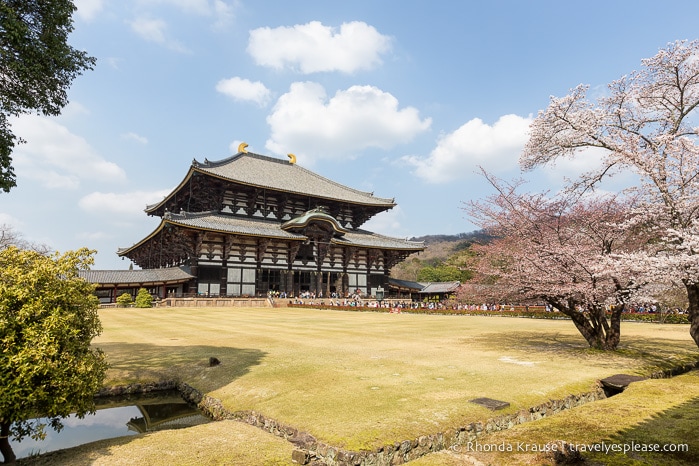
Nara Park is very large and packed with the typical Japanese tourist attractions- ancient shrines and temples, imposing gates, wooden pagodas and oh-so pretty cherry trees. More uniquely, there is even a big Buddha and about 1,200 free-roaming, tame deer.
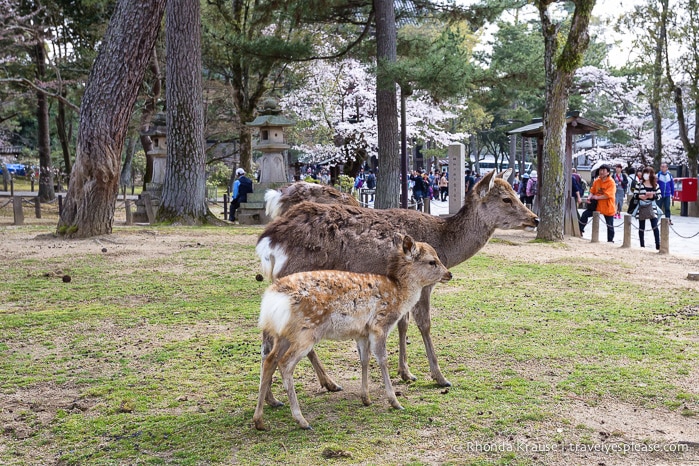
Those deer! They stole my heart and most of my attention. I was so smitten that I almost lost interest in exploring the rest park. Almost…
I did eventually take a hiatus from feeding the deer so we could make our way around to the main sites in Nara Park. Here’s a look at some of the things to see and do in Nara Park.
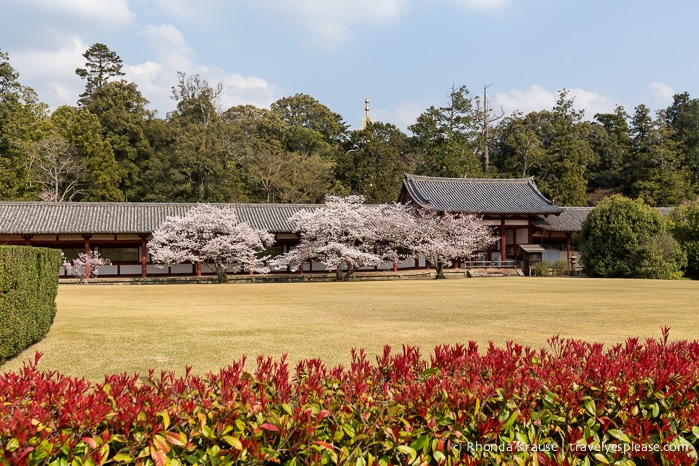
Things to See and Do in Nara Park- Main Attractions
With so many attractions in Nara Park, it requires a good portion of the day to visit, at least if you want to enjoy it at a relaxed pace. We started our self-guided walking tour of Nara Park at the west end, which is closest to the Japan Rail station.
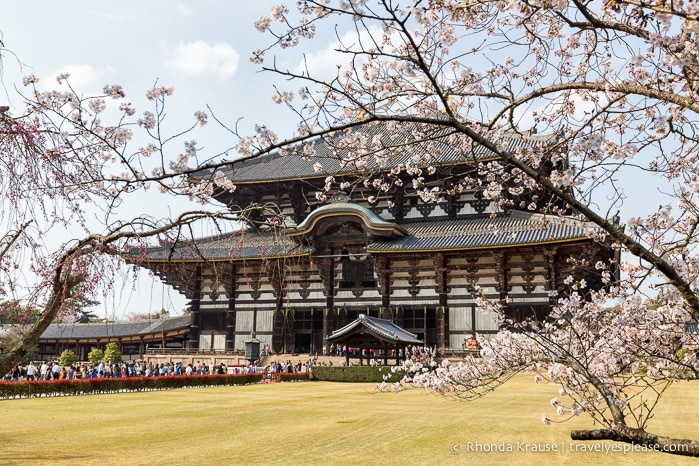
Stroll Around Kofukuji Temple
Our first stop in Nara Park was Kofukuji Temple. This Buddhist temple was founded in 669 and is one of Nara’s eight historic monuments inscribed on UNESCO’s World Heritage List.
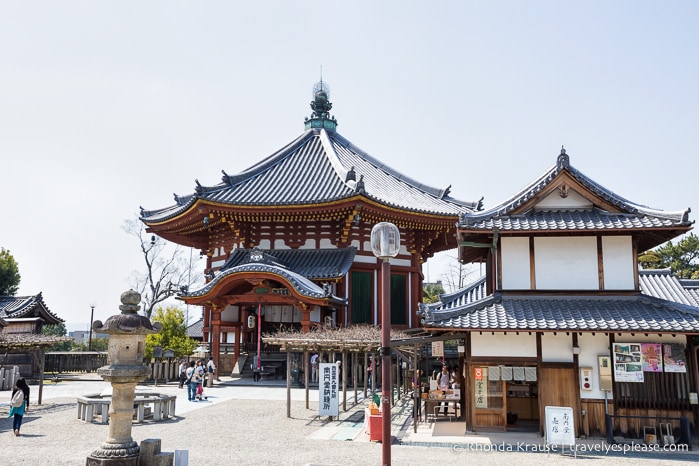
We didn’t do much here apart from strolling past one of the octagonal halls, the East Golden Hall and the five-storied pagoda.
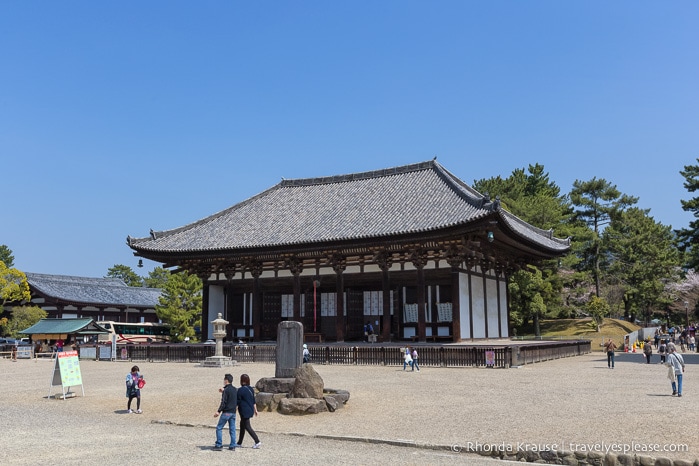
This pagoda is the second highest in Japan, at 50.1 metres (the tallest can be found at To-ji Temple, in Kyoto). The pagoda is also a reconstruction, completed in 1436, as the original one had a tendency for catching fire.
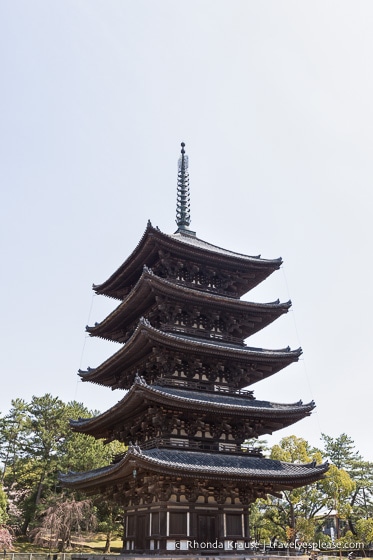
Himuro Jinja Shrine
Making our way further into the park, we briefly stopped at the Himuro Jinja Shrine.
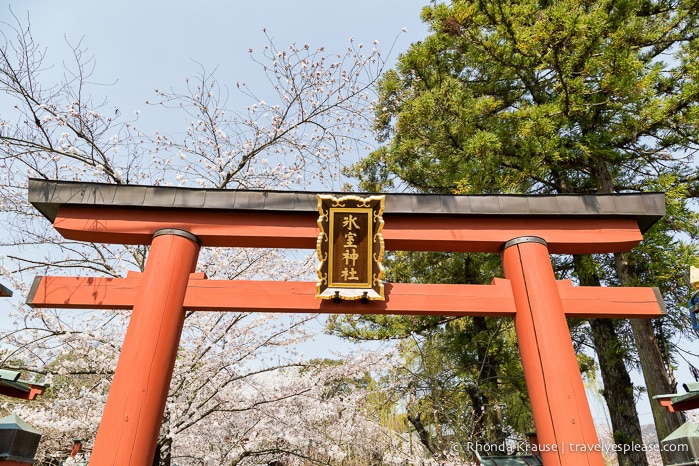
Its name means “ice room shrine” because the main ritual here involved encasing fish in blocks of ice before offering them to the gods.
My favourite thing about this shrine was the cherry blossoms. I sure do love those weeping cherry trees!
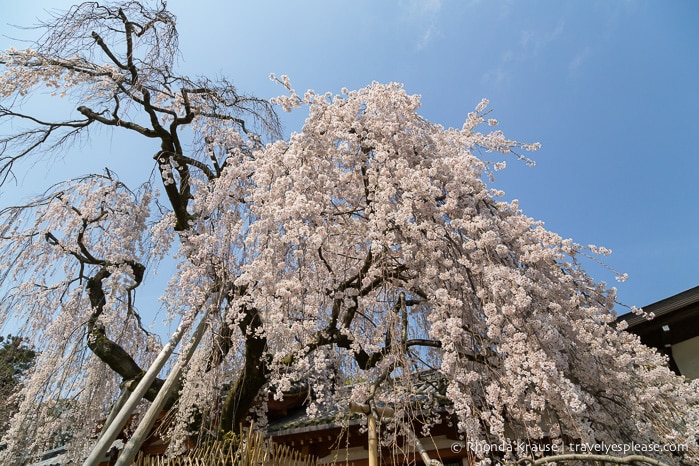
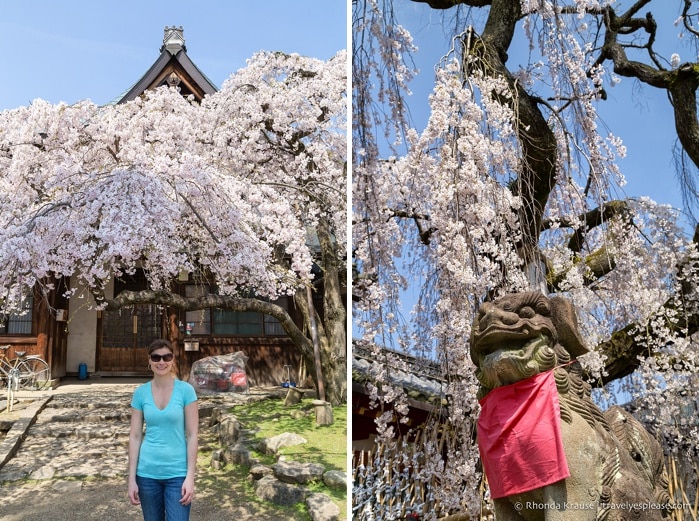
Feed the Deer
Feeding the deer in Nara Park was the highlight of my visit and one of my favourite experiences in Japan. These little cuties are surprisingly tame and well mannered, even bowing their head to ask for the special deer crackers you can buy throughout the park.
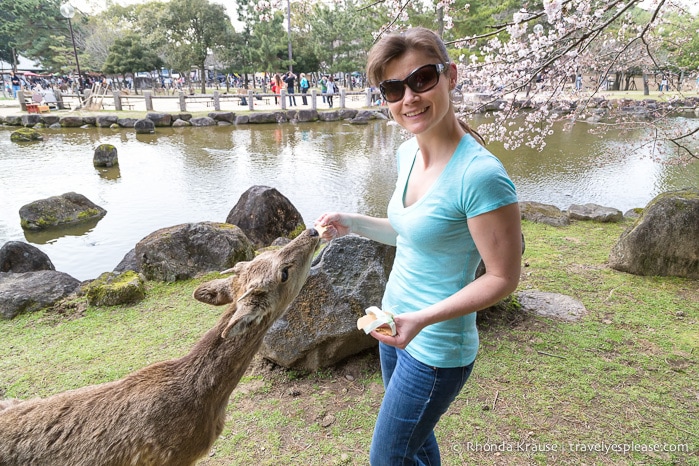
It was very cool to see deer casually walking down the sidewalks, mixed in with the crowds of tourists. These deer are so popular that they have become a symbol of the city, and a big reason why visitors flock to Nara Park.
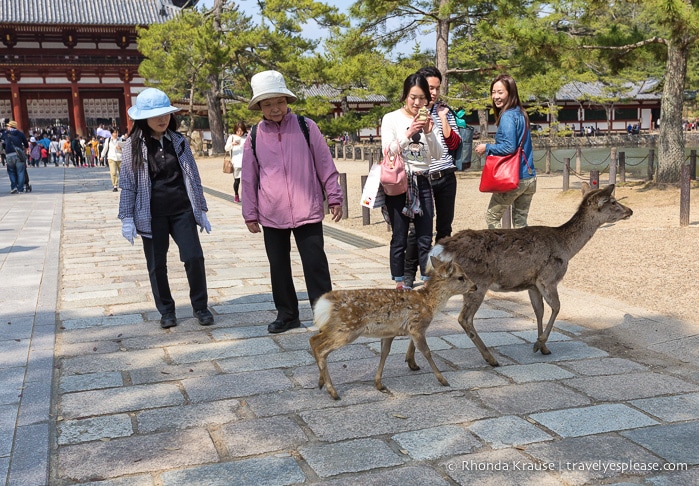
Pass Through Nandaimon Gate
Nandaimon (Great Southern Gate) acts as the main entrance to Todai-ji Temple. This 13th century wooden gate features two muscular, fierce looking Nio Guardian statues. The statues were made in 1203 and are 8.5 metres (28-feet) tall! They are understandably protected behind a screen, but it didn’t make for good pictures.
Both the Nandaimon Gate and its Nio statues are designated national treasures.
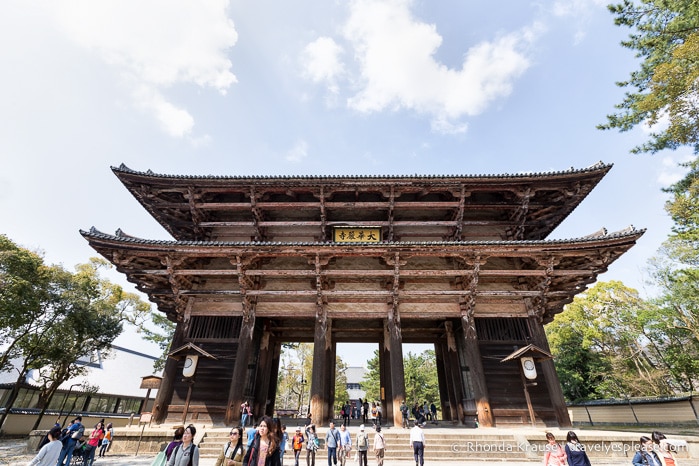
Relax at Kagami-ike Pond
Kagami-ike pond is situated between Nandaimon Gate and Todai-ji Temple.
This was a picturesque place for us to hang out and feed the deer while we waited for the crowds to die down at Todai-ji Temple.
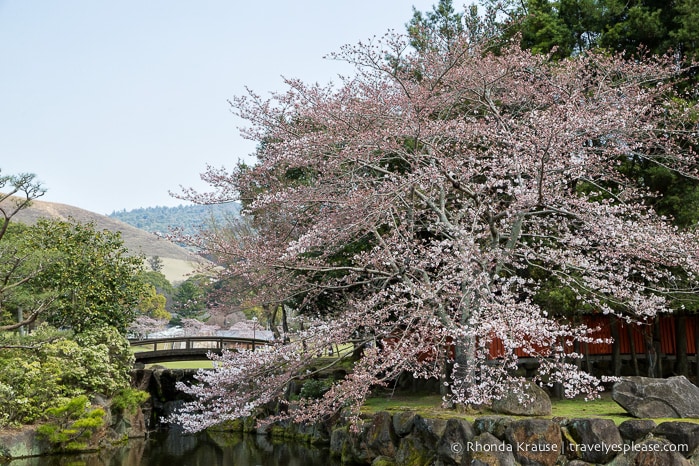
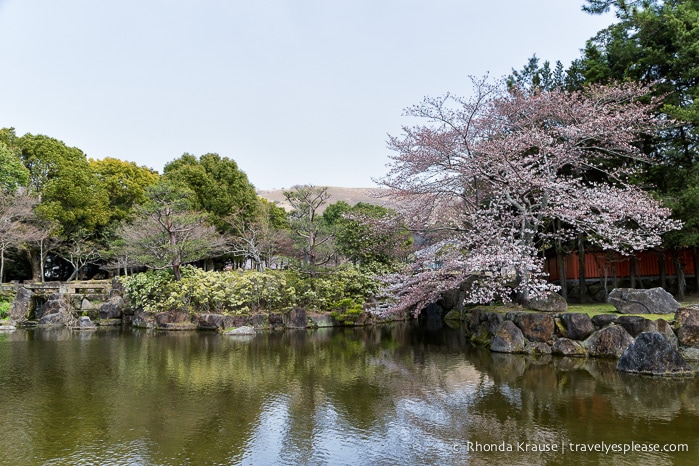
Visit Todai-ji Temple
In addition to the deer, the other main attraction in Nara Park is Todai-ji Temple.
This temple is famous for two things- being the world’s largest wooden building until 1998, and housing the world’s biggest bronze statue of Buddha.
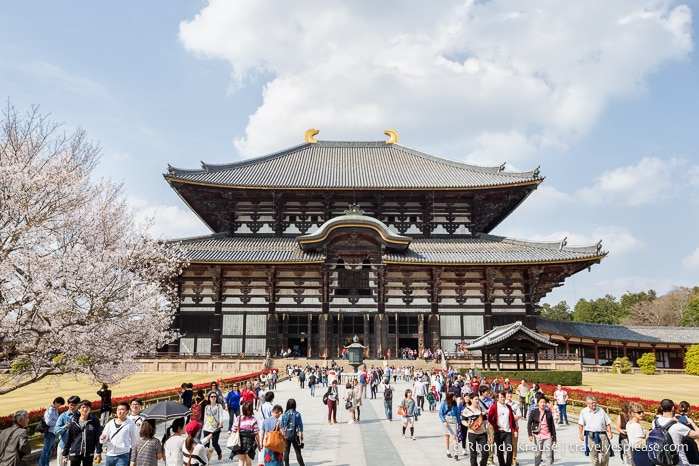
Todai-ji Temple was originally constructed in 752, under the order of Emperor Shomu, to be a powerful center of Buddhism in Japan. Today, it is the headquarters of the Kegon school of Buddhism and part of the UNESCO World Heritage Site designation.
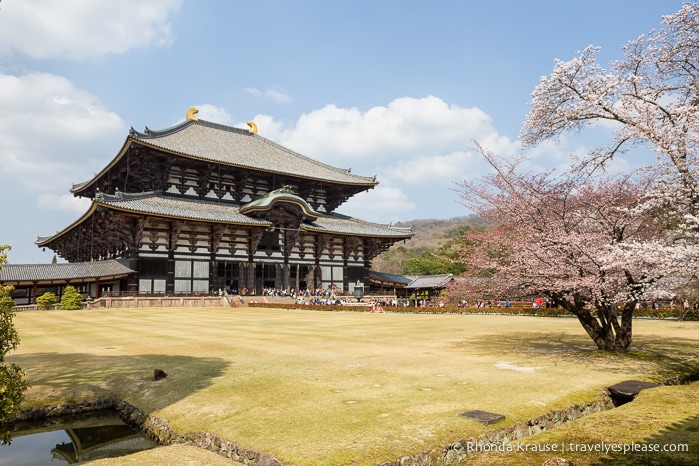
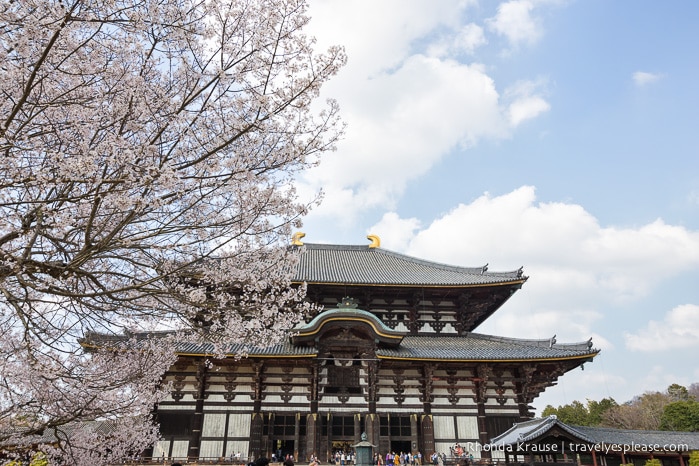
The main hall of Todai-ji (Great Buddha Hall) has been rebuilt twice, the current version dating back to 1709. It’s incredible to think that even though this reconstruction is only two-thirds the original size, it still was at one time the largest wooden building in the world!
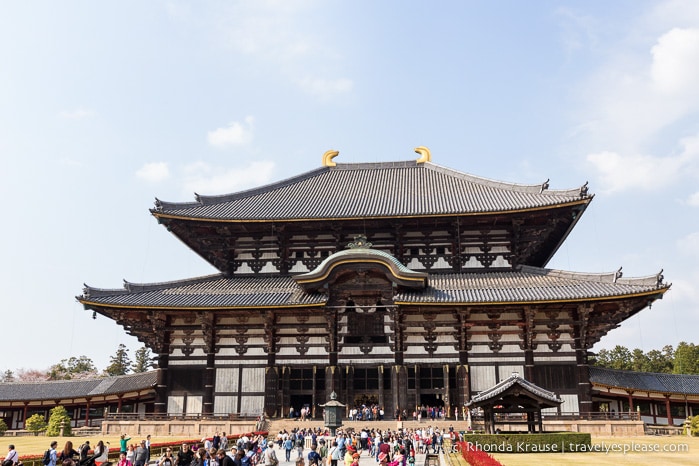
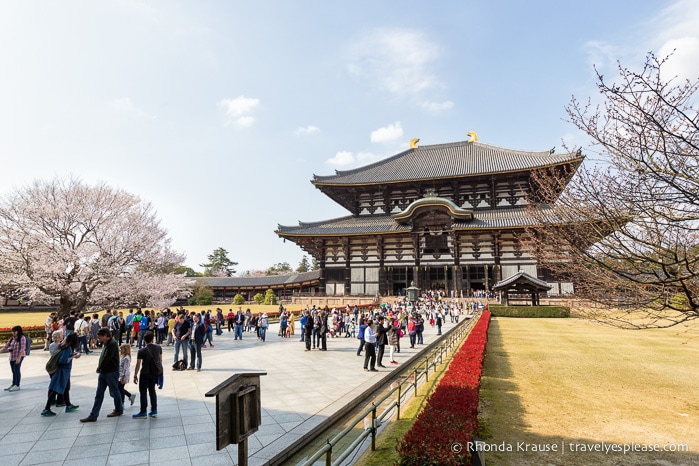
Inside the Great Buddha Hall (Daibutsuden) is of course, the Great Buddha. From photos it’s hard to tell just how big this statue is. Looking at it, I felt like its hand was taller than my whole body!
The Buddha is 16 metres (53 feet) tall and took hundreds of tons of molten bronze, mercury and vegetable wax to make when it was cast in 752. The project even nearly bankrupted the country!
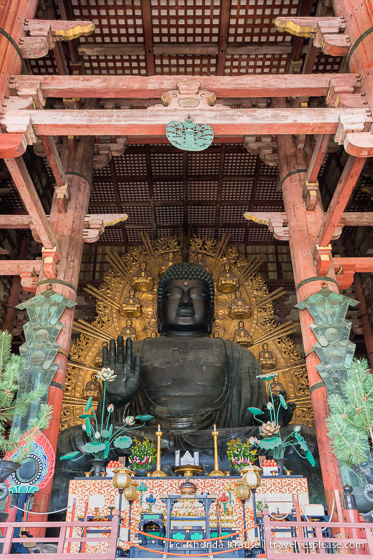
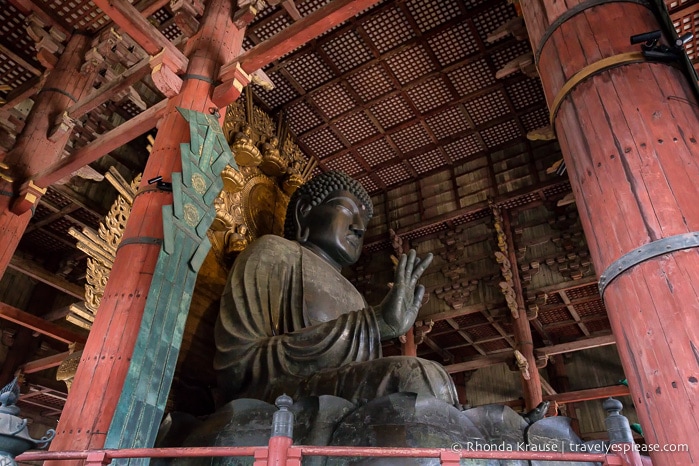
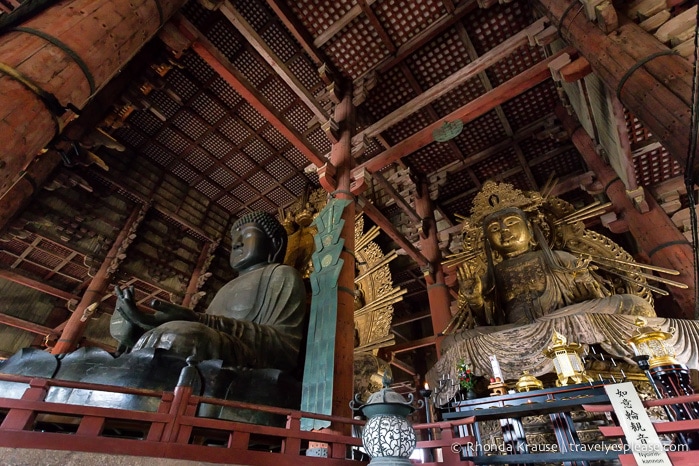
Behind the Buddha is a wooden pillar with a really small hole cut into it. If you’re up for trying to squeeze through it, popular belief holds that you will attain Nirvana.
Enjoy the Views at Nigatsudo Hall
After visiting Todai-ji Temple, we walked over to Nigatsudo Hall.
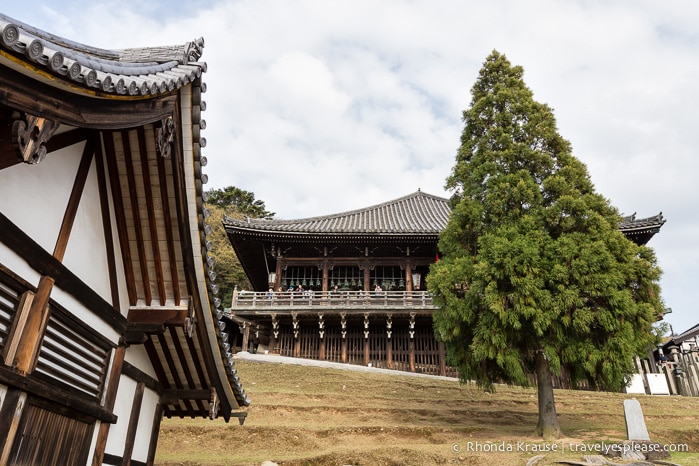
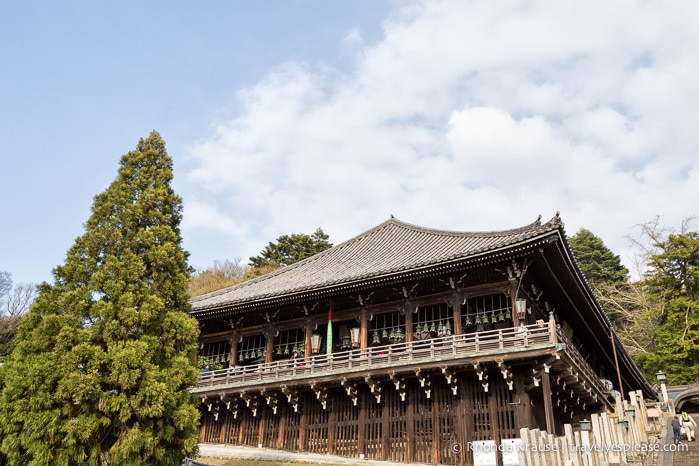
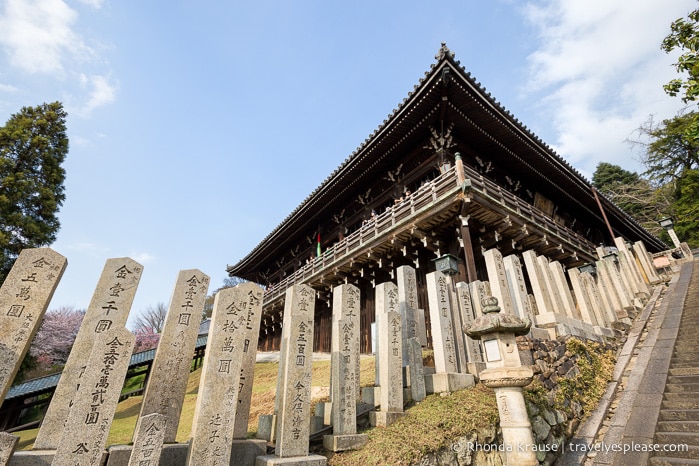
This beautiful hall has a big balcony overlooking Nara Park and offers up some wonderful views! It’s a great place to take a moment and reflect on your visit to Nara.
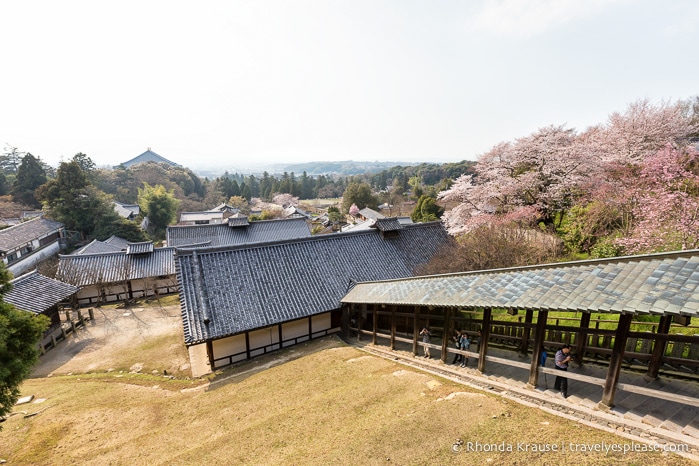
Wander Through Kasuga Taisha Shrine
Kasuga Taisha is another popular spot in Nara Park and is also included in the World Heritage Site designation.
The paths to this Shinto shrine are lined with about 2000 stone lanterns. Inside the shrine there are more still- about 1000 hanging bronze lanterns.
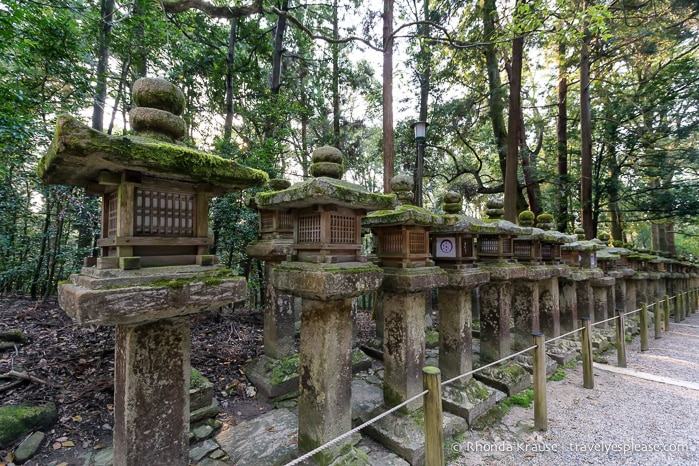
Honestly, we didn’t spend much time at this shrine. It was getting late in the day, hunger and fatigue were setting in, and it just wasn’t speaking to me.
Still, I found it interesting that since 768, many of the shrine’s buildings have been demolished and rebuilt in identical fashion every 20 years. That means parts of the shrine have been reconstructed over 60 times! This rebuilding is done because of the Shinto belief in purity and renewal.
Final Thoughts About Our Visit to Nara Park
We had a very enjoyable day casually wandering through Nara Park and had so much fun feeding the deer. The park’s collection of impressive architecture, wildlife, and pretty parkland is why we think it’s one of the best places to visit in Japan. Nara Park should definitely be included on any Japan itinerary, especially if it’s your first trip to Japan.
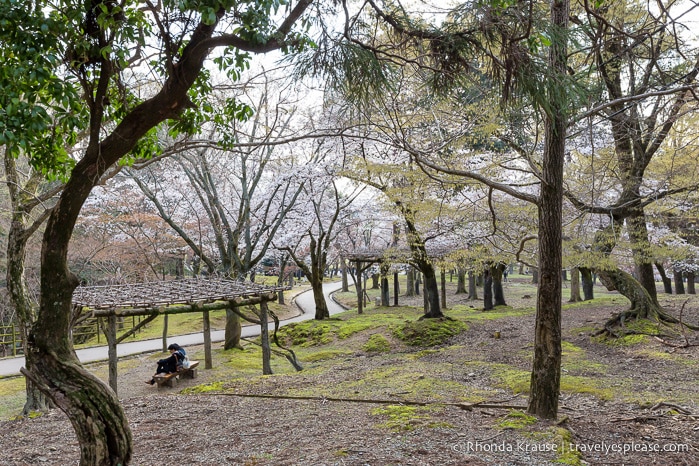
The only thing I wasn’t keen on, was all the souvenirs being sold at Todai-ji Temple. There were racks of items for sale inside the Daibutsuden Hall, right across from the Great Buddha. I understand the need to make money to operate the temple, but the commercialism changed the mood of the place, especially when compared to other temples in Japan we visited. I thought it would be less intrusive if the souvenirs were only sold outside of the main temple building.
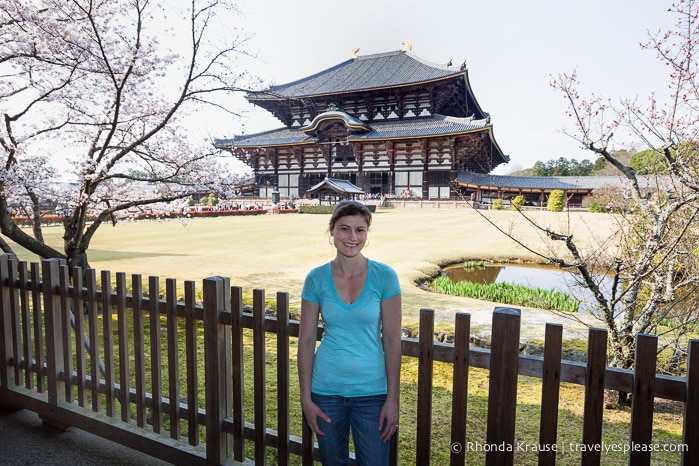
On a more positive note, I was glad there were people on hand offering free English introductions to Todai-ji Temple. It was nice to be able to learn about the temple from a local. The man we talked with did a wonderful job explaining the history and sharing interesting facts with us. They aren’t allowed to tour people around the inside, so make sure you ask all your questions before going in.
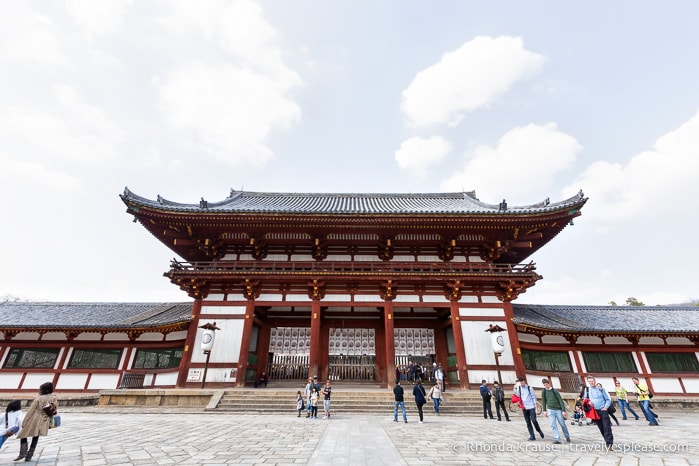
More Photos of Nara Park
Here are a few more pictures of Nara Park for you to enjoy!
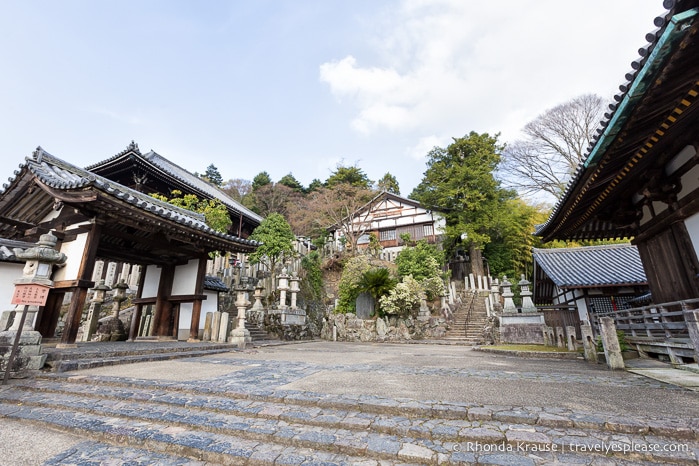
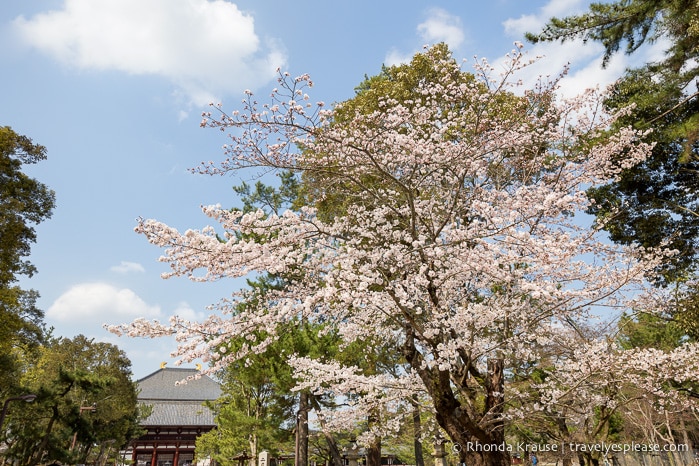
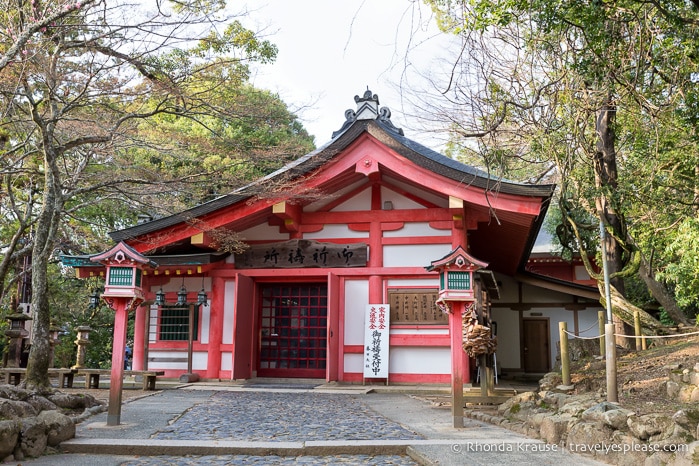
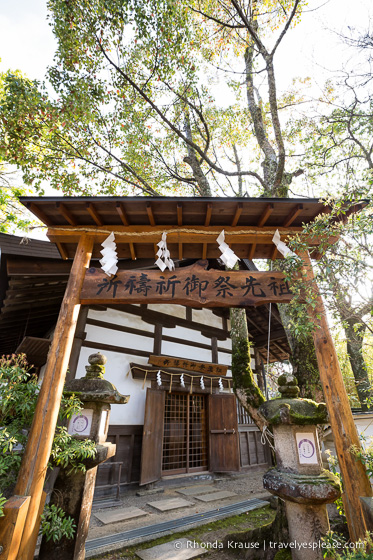
Tips for Visiting Nara Park
Getting to Nara Park: From the JR station, Nara Park is about a 15-20 minute walk up Sanjodori Street. From the Kintetsu station, it’s about a 5 minute walk. You can also take the bus, as there are stops throughout the park.
Todai-ji Temple: Todai-ji Temple’s hours are as follows: 7:30 am-5:30 pm (April-October), 8:00 am-5:00 pm (November-March).
- Admission to Todai-ji Temple costs ¥800 for Daibutsuden Hall, or ¥1200 if you also want to visit the museum.
- Confirm current hours and prices here.
Kasuga Taisha Shrine: Kasuga Taisha is open daily from 6:30 am-5:30 pm (March-October) and 7:00 am-5:00 pm (November-February).
- The offering hall can be visited free of charge, but to see the inner area/main sanctuary you have to pay ¥700.
- Confirm current hours and prices here.
Nigatsudo Hall: There is no admission cost to visit Nigatsudo Hall. There is a tea house and souvenir shop nearby.
Information was updated January 2025, but can change without notice. Please confirm directly with service providers.
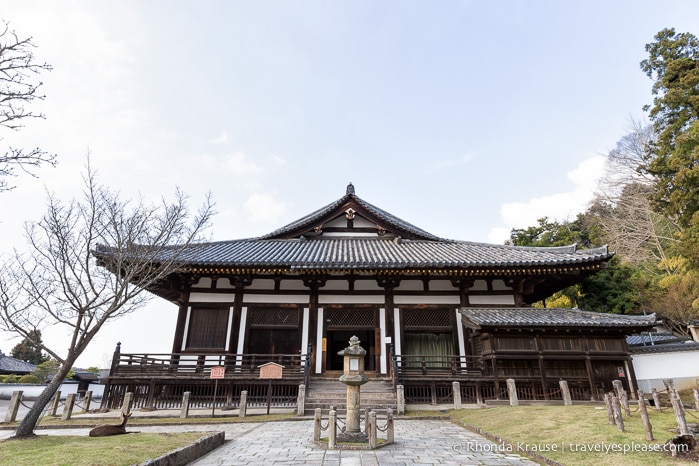
Accommodations in Nara
For your convenience, here is a list of hotels in Nara. Please consider booking your Nara accommodations through the included link. It costs nothing extra and helps support this website. Thank you!
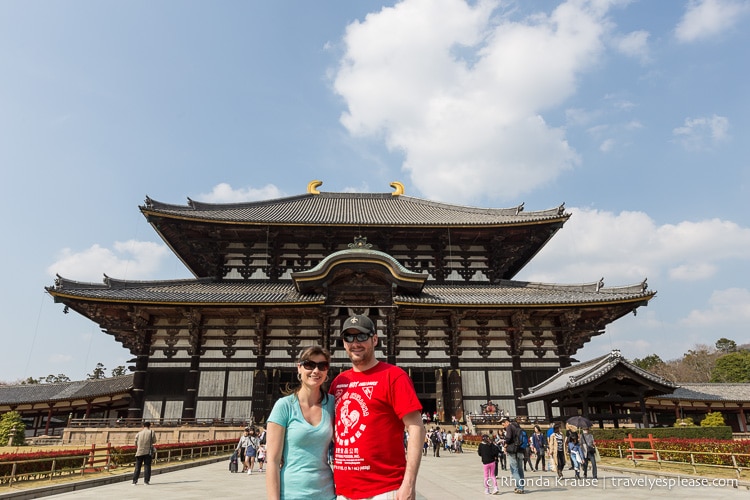
More Japan Destinations and Travel Guides
- Visiting Horyu-ji Temple- The World’s Oldest Wooden Buildings
- Himeji Castle- A National Treasure of Japan
- Koyasan- Guide to Visiting the Sacred Sites of Mt. Koya
- Yoshino- Cherry Blossoms and a Whole Lot More

